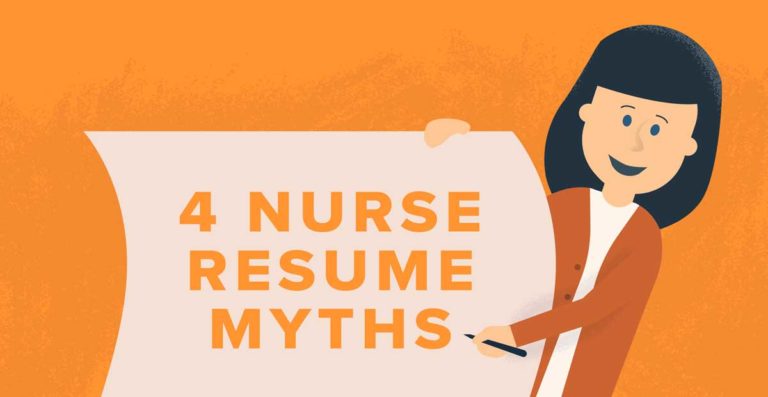Résumés: the one thing that every nurse needs but very few like to write. If writing or updating your résumé has held you back from applying for a new job opportunity, you are not alone!
Maybe you never learned how to write a proper résumé in school (most nurses have not!) and the majority of your information has been from an internet search.
Here are four common résumé myths & changes you can make today!
Myth #1: Include an objective section at the top of every resume
Truth: Write a professional summary instead
Common resume recommendations suggest using an objective statement at the top, which might include a sentence such as this:
“New graduate RN seeking a clinical position in the ICU to further develop my nursing skills and care for critically ill patients.”
While this clearly defines your goals and intentions, consider reframing your perspective and considering your future employer’s point of view. Change your objective section to a professional summary, and highlight how your talents align with the goals of your future employer. Notice how the following professional summary clearly shows the candidate’s passion for the field as well as their aptitude for success.
“Compassionate and detail-oriented new graduate registered nurse seeking to strengthen critical care foundation through XYZ Hospital’s Pediatric Critical Care RN Residency Program. Demonstrated academic excellence with cumulative GPA of 3.9 and >95% positive preceptor evaluations. Passionate for the care of the pediatric population; 5+ year service as pediatric community advocate through XYZ volunteer organization.”
Myth #2: All résumés must be 1 page
Truth: If you include quality information, length won’t matter
While it’s certainly true that the first page of a résumé will give the first impression to your hiring manager, it’s completely false that it cannot be longer than a single page. Here, it’s important to focus on quality, not quantity.
You will want to be clear and concise with your education, certifications, experience, and achievements. Often this can fit on a single page; however, if your résumé turns out to be two or even three pages because of numerous relevant achievements and activities, that’s okay!
If you’re looking to trim your résumé, consider removing statements that iterate obvious job responsibilities (performed head-to-toe assessment on patients; implemented orders as directed by the provider) in favor of statements about accomplishments while in a particular position (spearheaded unit initiative that implemented non-pharmacologic pain management interventions resulting in a 25% reduction in pain score).
Myth #3: Your résumé should only include paid work experience
Truth: Community service and shadow experience will make you stand out as an applicant
If you’re looking to make a lasting impression on a hiring manager, highlight your experience in volunteer & shadow positions.
Giving back to one’s community or an underserved population shows that you have an altruistic character, and this demonstrates through your actions that you have a genuine desire to help others.
Participating in shadow opportunities also shows that you seek out opportunities to better yourself in a professional setting, which is a desirable quality in a candidate for employment. Both of these unpaid experiences show that you are willing to give of yourself without any compensation expected in return.
If you’re unsure whether to include a particular volunteer activity because of its relevance, a good guideline is to include any volunteer activities within the past five years regardless of relevance and include anything in the medical field within the past ten years.
Myth #4: Only send your résumé when you see a job opening posted
Truth: Making a connection outside of a hiring cycle may make you more memorable
In today’s digital age, it’s easy to rely on the internet for all sources of information. What hospital doesn’t have a website, right? There is no shortage of job search sites out there. If you send our résumé to enough job postings, you’re bound to get an interview somewhere… right?
Maybe.
However, if you want to land not only a job but also land a job you love, consider working backward. Visualize yourself in your ideal nursing job. What does it look like? Is it at a particular institution, or perhaps a particular specialty? Then, find that ideal setting and let them know that you want a job.
This may seem bold, but what do you have to lose? Maybe you are hoping to get a position in your friend’s unit at the local hospital, but they don’t have any postings right now.
Do something to be memorable. Make a phone call, send a note, network, introduce yourself at an event. When it comes time that a position is open, you will have already made a connection, potentially keeping yourself front-of-mind for the manager or hiring team.
Writing a résumé may seem like a daunting task, but if you have the right tools and information, you can showcase your strengths and land not just any job, but the right job where you can be nurtured and grow as a professional.
Author Bio: Amanda Guarniere is an emergency nurse practitioner and a résumé strategist for medical professionals. She is the founder of The Résumé Rx, where she designs résumé templates and provides actionable tips on how to put your passions on paper.
